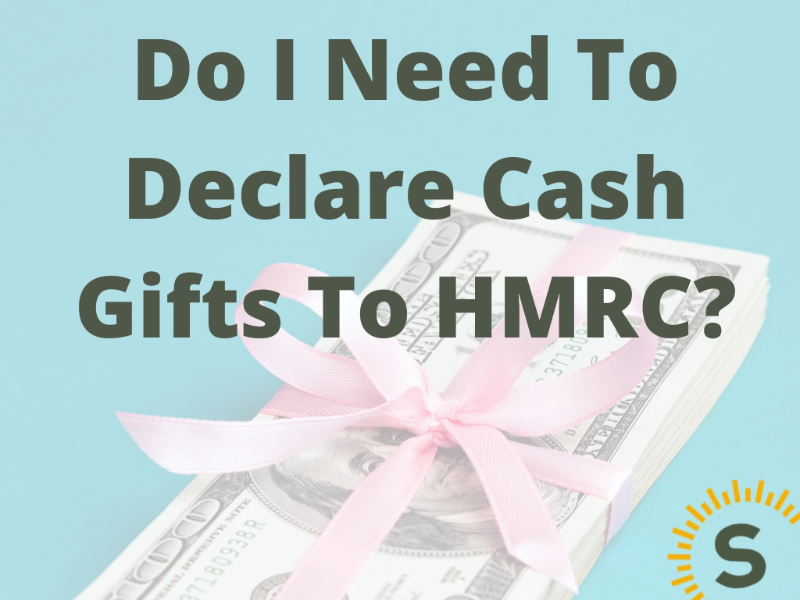
The rules surrounding tax and gifts can be complex, leading many to wonder, "Do I need to declare cash gifts to HMRC?"
Whether you're considering gifting a property or cash, or you've recently received a cash gift, understanding the associated tax rules can help you make informed decisions.
This insight explores the question in detail.
Cash Gifts below £3,000 don't need reporting to HMRC as they are tax-free. But, if the giftor passes away within seven years, inheritance tax may apply. Any Income earned from the gift, like bank interest, could become liable for income tax.
You can earn up to £12,570 in the 2023/24 tax year without paying any tax, thanks to your personal allowance.
Additionally, you have a personal savings allowance, allowing the first £1,000 of savings income to be taxed at a 0% rate if your total adjusted net income is less than £50,270.
In the UK, you generally don't have to pay inheritance tax on cash gifts you receive during someone's lifetime. However, if the person who gave you the cash gift passes away within seven years of making the gift, it might be subject to inheritance tax.
The amount of tax depends on when the gift was made and the total value of the giver's estate at their death. Gifts below £3,000 per year, certain small gifts, and gifts for specific occasions like weddings are typically exempt from inheritance tax.
When it comes to cash gifts, there are certain exemptions that may apply. For example, if the gift is from your parents and the total funds given produce income of less than £100 before tax each year, it will not be subject to the parental settlement rules. Other exceptions include Child Trust Funds, Junior ISAs, and pension contributions made by your parents on your behalf.
If you are under 18 years old and receive gifts from your parents, certain rules apply. If your parents provide you with funds that generate income of over £100 before tax each year, this income will be treated as a 'parental settlement' and taxed as your parent's income, not yours. However, if the funds come from your grandparents or other family members, these rules do not apply.
Additionally, if you are 16 or 17 years old and your parents make a gift to an ordinary Individual Savings Account (ISA) in your name, the parental settlement rules will still apply if your total income from parental gifts exceeds £100 before tax each year. However, gifts to Junior ISAs do not fall under the parental settlement rules.
If your family members lend you money, there are usually no immediate tax consequences. However, if you agree to pay them interest, the lender may be required to pay tax on the interest they receive, depending on their individual tax position.
It's important to note that a loan only becomes a gift when the lender explicitly states that they do not expect repayment.
In the UK, there's no set limit on how much money you can give family. But if you give a lot, these gifts could be subject to inheritance tax, especially if the giver passes away within seven years of making the gift. You can give small amounts tax-free each year. Special occasions like weddings have bigger allowances.
In the UK, you can receive up to £3,000 per tax year as a tax-free cash gift. This allowance applies to the total amount gifted, not per person. If you're a married couple or in a civil partnership, you both have an annual exemption of £3,000 each, allowing for a combined £6,000 gift without tax implications.
You can gift £3,000 per tax year to your son without it being subject to inheritance tax. However, if you plan to gift £50,000 or a larger amount, there may be potential inheritance tax implications.
You can gift £3,000 per tax year to your son without it being subject to inheritance tax. However, if you plan to gift £100,000 or a larger amount, there may be potential inheritance tax implications.
Yes, you can gift a friend £100,000 in the UK. Gifts to friends are generally not subject to inheritance tax or other taxes. However, it's crucial to ensure the gift is genuine and not a way to avoid taxes or other legal obligations.
If you are considering making charitable donations, it's worth noting that gifts to charities and political parties are generally exempt from inheritance tax. However, it's important to ensure that the recipient organisation qualifies for such exemptions.
It's crucial to maintain thorough records and documentation for all financial gifts, especially those that exceed the annual exemption threshold (£3,000). This documentation serves several purposes:
Clear records of gifts can help with estate planning and determining potential inheritance tax liabilities. When individuals pass away, their estate's executor will need to account for all gifts made within the seven years preceding their death to calculate any applicable inheritance tax.
Keeping records of past gifts allows individuals to track their gifting history, ensuring that they stay within the tax-free limits and exemptions. This helps in avoiding unintentional tax liabilities.
HMRC may request documentation and evidence to support claims of tax-free gifts, especially during tax audits or estate assessments. Having organised records can simplify the process and demonstrate compliance with tax regulations.
In cases where gifts are made to family members or beneficiaries, clear documentation can help prevent disputes and legal challenges over the intentions and values of gifts.
Records also play a role in tracking the use of the annual exemption and any unused portion that can be carried forward for one year. This can help maximise the tax-free gifting opportunities.
For non-cash gifts, such as property or investments, maintaining records of their value at the time of the gift is essential. This establishes a clear basis for potential capital gains tax calculations when the gifted asset is eventually sold.
Avoiding tax on cash gifts typically involves taking advantage of exemptions and allowances provided by tax laws. Here are some strategies that individuals can consider to minimise or avoid paying tax on cash gifts:
In the UK, individuals can give up to £3,000 per tax year as a tax-free cash gift. This is known as the annual gift allowance. Married couples or those in civil partnerships can combine their allowances, allowing for a joint gift of up to £6,000 without tax implications.
Instead of making a direct cash gift to an individual, you can establish a trust and gift cash into the trust. The funds in the trust can be managed and distributed according to the terms of the trust deed. Depending on the type of trust, this can provide various tax advantages.
Small gifts of up to £250 per person per tax year are generally exempt from inheritance tax. These gifts can be given to multiple individuals, and they won't count toward the annual gift allowance.
Certain gifts made for specific life events, such as weddings or civil partnerships, may be exempt from inheritance tax up to certain limits. For example, in the UK, gifts up to £1,000 per person for weddings are usually tax-free.
If you have surplus income and can demonstrate that the gifts you give do not affect your standard of living, they may be exempt from inheritance tax. This is known as the "normal expenditure out of income" exemption.
Gifts between spouses or civil partners are typically exempt from inheritance tax, regardless of the amount.
Donations to registered charities and political parties are usually exempt from inheritance tax. This can be a tax-efficient way to give.
Consider using tax-efficient savings and investment accounts, such as Individual Savings Accounts (ISAs), to grow your wealth without incurring income or capital gains tax.
Getting expert advice is crucial when dealing with tax complexities related to property and cash gifting. A financial adviser or tax specialist can give tailored inheritance tax planning advice based on your situation, helping you navigate tax laws effectively.
In summary, although you don't have to declare cash gifts to HMRC, understanding property and cash gifting's tax implications, like the seven-year rule and exemptions, is essential. Seek professional help to make the best choices for your unique circumstances and reduce potential inheritance tax impact.
Source:

Stuart is an expert in Property, Money, Banking & Finance, having worked in retail and investment banking for 10+ years before founding Sunny Avenue. Stuart has spent his career studying finance. He holds qualifications in financial studies, mortgage advice & practice, banking operations, dealing & financial markets, derivatives, securities & investments.





Our website offers information about financial products such as investing, savings, equity release, mortgages, and insurance. None of the information on Sunny Avenue constitutes personal advice. Sunny Avenue does not offer any of these services directly and we only act as a directory service to connect you to the experts. If you require further information to proceed you will need to request advice, for example from the financial advisers listed. If you decide to invest, read the important investment notes provided first, decide how to proceed on your own basis, and remember that investments can go up and down in value, so you could get back less than you put in.
Think carefully before securing debts against your home. A mortgage is a loan secured on your home, which you could lose if you do not keep up your mortgage payments. Check that any mortgage will meet your needs if you want to move or sell your home or you want your family to inherit it. If you are in any doubt, seek independent advice.